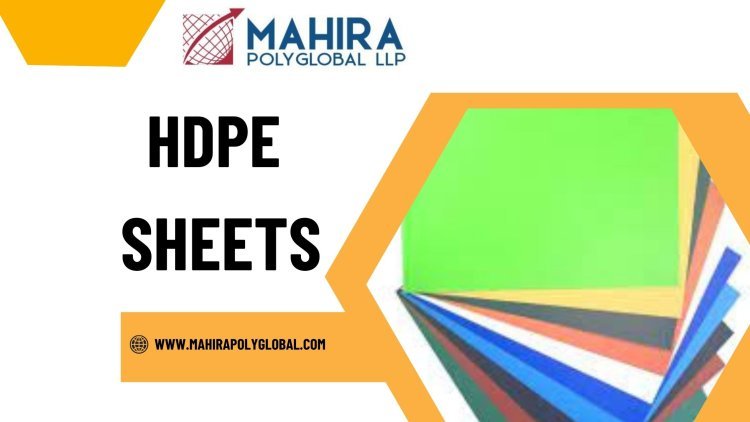Top 5 Industries That Rely on HDPE Sheets for Their Operations
Top 5 Industries That Rely on HDPE Sheets for Their Operations

High-Density Polyethylene (HDPE) sheets are increasingly becoming a critical component in various industries due to their exceptional properties such as strength, chemical resistance, and versatility. These sheets are used in applications ranging from construction to food processing. In this article, we will explore the top five industries that rely on HDPE sheets for their operations, highlighting the reasons for their popularity and the benefits they offer. We will also touch upon the pricing and availability of HDPE sheets, particularly from trusted suppliers like Mahira Polyglobal LLP.
1. Construction Industry
The construction industry is one of the largest consumers of HDPE sheets. These sheets are used in various applications, including:
- Vapor Barriers: HDPE sheets provide an effective moisture barrier in foundations, preventing water from seeping into buildings.
- Roofing Membranes: Their UV resistance makes them ideal for use as roofing membranes, protecting structures from weather elements.
- Wall Panels: HDPE sheets are often used as wall panels in commercial buildings due to their durability and ease of installation.
The high density polyethylene plastic's ability to withstand extreme weather conditions and physical stress makes it a preferred choice in this industry.
2. Agriculture
Agriculture is another significant sector that relies heavily on HDPE sheets. Here are some of the ways these sheets are utilized:
- Greenhouse Covers: HDPE sheets are used as covers for greenhouses, allowing sunlight to penetrate while providing insulation against harsh weather conditions.
- Mulching Films: The Plastic Sheet HDPE is commonly employed as a mulch film to suppress weeds, retain moisture, and regulate soil temperature, which enhances crop yields.
- Water Management: HDPE sheets are used to line ponds and canals, preventing water loss and promoting efficient irrigation practices.
The ability of HDPE to resist chemicals and UV radiation makes it particularly suitable for agricultural applications.
3. Food Processing
In the food processing industry, safety and hygiene are paramount. HDPE sheets are utilized for various reasons:
- Food Storage: High-density polyethylene plastic is safe for food contact and is often used to create storage containers and packaging.
- Cutting Boards: Food-grade HDPE sheets are commonly used for cutting boards due to their non-toxic nature and ease of cleaning.
- Processing Equipment: They are also employed in food processing machinery, where durability and resistance to harsh cleaning agents are essential.
The food processing sector benefits significantly from HDPE sheets, as they meet stringent health regulations while providing durability and ease of maintenance.
4. Manufacturing
The manufacturing sector relies on High Density Polyethylene Plastic or a variety of applications, including:
- Machine Guards: HDPE sheets are used as protective barriers around machinery, ensuring safety in manufacturing environments.
- Conveyor Systems: They are often employed in conveyor systems, providing a durable surface that can withstand wear and tear.
- Component Fabrication: HDPE sheets can be easily fabricated into various components required in manufacturing processes, thanks to their lightweight and robust nature.
The versatility and durability of HDPE sheets make them an indispensable material in manufacturing.
5. Transportation
The transportation industry also finds numerous applications for Hdpe Plastic Sheet particularly in logistics and cargo management:
- Truck Liners: HDPE sheets are used to line the interiors of trucks, protecting the cargo area from damage and wear.
- Pallets and Containers: They are often employed in the manufacture of pallets and containers, providing a lightweight yet strong option for transporting goods.
- Protective Barriers: HDPE sheets can serve as protective barriers in loading docks and warehouses, enhancing safety and efficiency in operations.
The strength-to-weight ratio of HDPE sheets makes them ideal for various transportation needs.
Conclusion
HDPE sheets are a versatile and essential material used across numerous industries, including construction, agriculture, food processing, manufacturing, and transportation. Their durability, chemical resistance, and ability to withstand environmental factors make them a preferred choice for many applications. As industries continue to prioritize sustainability and efficiency, the demand for HDPE sheets is likely to grow.
For businesses looking for high-quality HDPE sheets, Mahira Polyglobal LLP offers a range of products designed to meet the needs of various sectors. Their commitment to quality and sustainability ensures that customers receive reliable materials that contribute positively to their operations.
Frequently Asked Questions (FAQ)
1. What are HDPE sheets made of?
HDPE sheets are made from high-density polyethylene, a strong and durable thermoplastic that provides excellent resistance to impact, moisture, and chemicals.
2. What industries use HDPE sheets?
The top industries that use HDPE sheets include construction, agriculture, food processing, manufacturing, and transportation.
3. Are HDPE sheets safe for food contact?
Yes, food-grade HDPE sheets are safe for food contact and are commonly used in food storage and processing applications.
4. How do HDPE sheets benefit agriculture?
HDPE sheets are used in agriculture for greenhouse covers, mulching films, and water management systems, contributing to increased crop yields and efficient irrigation.
5. What is the typical price of HDPE sheets?
The price of HDPE sheets can range from $2 to $5 per square foot, depending on the thickness, size, and supplier.
6. Where can I purchase HDPE sheets?
You can purchase HDPE sheets from various suppliers, including Mahira Polyglobal LLP, which offers a wide selection of high-quality sheets for different applications.
7. How do HDPE sheets contribute to sustainability?
HDPE sheets are recyclable and contribute to reducing plastic waste, lower carbon emissions, and conserving natural resources, promoting a more sustainable approach to manufacturing.
8. Can HDPE sheets be used outdoors?
Yes, HDPE sheets are UV resistant and can be used in outdoor applications, such as in construction and agriculture, without degrading.
By understanding the vital role HDPE sheets play in these industries, businesses can make informed decisions that enhance their operations while contributing positively to environmental sustainability.
What's Your Reaction?

















